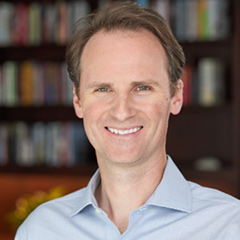Assistant Professor at Cornell University and Founder of the Citizens and Technology Lab (CAT Lab) J. Nathan Matias and MacArthur President John Palfrey address the need for industry-independent research about technology’s impact on society and how to build a relationship with technology that advances equity and justice.
Holding Digital Power Accountable ›
Building Inclusive Ecosystems ›
The Just Imperative and Reason for Hope ›
Holding Digital Power Accountable
John
We have long supported research to improve policy and practice. One of our commitments is to support work related to technology in the public interest. Could you tell us a bit about how CAT Lab is doing research that helps us understand the impact of technology on society and improve our policies and practices accordingly?
Nathan
People are rightly worried about the effects of digital power in their lives. Digital technologies have become so basic to society that we now worry about their impact on our safety, politics, health, education, and having a fair chance. In 2018, Pew found that Americans trust tech executives even less than members of Congress.
CAT Lab works toward a world where digital power is guided by evidence and accountable to the public. Inspired by community scientists who pioneered food safety and environmental science, we work alongside communities to create usable evidence on digital life—independently from the tech industry.
What does that look like in practice? In 2016, CAT Lab tested ways to prevent online harassment with r/science, a community of over 1,200 volunteers who organize the world’s largest online conversation about science. Working independently from Reddit, we created software to conduct a field experiment. Together we discovered community ideas that reduced harassment by eight percentage points and broadened who participated in science conversations online. Our discoveries made a direct difference in the lives of millions of people and were also published in a leading scientific journal.
More recently, we have worked with communities to audit algorithmic decision makers and test concerns about phone addiction for people at the margins. In every case, we combine community organizing with novel software development, so the public can get answers, even when tech companies are indifferent or resist scrutiny.
Building Inclusive Ecosystems
As a leader and scholar, you have often developed initiatives that bring together communities of practice to make progress on societal challenges. One example is your work on child safety, youth empowerment, and tech policy, where solutions involve all levels of society, including children, parents, schools, civil society, companies, and governments.
Now in your role at MacArthur, you are leading an organization with a track record of ecosystem-building, including work on technology in the public interest. How can we think about the future of inclusive ecosystem-building on technology and society at a time when the power of tech companies is being re-negotiated?
John
Thanks much, Nate, for this invitation to reflect on how we build inclusive ecosystems. MacArthur has done several things quite well over the years, I think—certainly the Fellows program, in its 41st year, has built a community of incredibly creative, diverse, stunningly productive individuals. Maybe less well known but equally apt as an example, MacArthur has funded and helped build research networks in a number of fields. One that is close to both of our work was the Digital Media and Learning network, led by Mimi Ito, a professor at University of California-Irvine. Mimi and her team built a terrific network of scholars, activists, artists, librarians, and others who care about re-imagining learning, teaching, and change-making in a digital environment.
What I like most about the current program area, Technology and the Public Interest, led by Associate Director Eric Sears, is the increasingly effective, diverse array of scholars, activists, artists, and others who are at the forefront of this re-negotiation of power that you describe. I think our job as a Foundation is to support you and others who are creating and redefining these new networks, offer what help we can, and get out of the way. So, the question is really back to you: what are the hallmarks of the kind of inclusive ecosystem that you would like to see—and to build?
Nathan
The idea of organizing for the common good always fills me with hope! I think our North Star needs to be an idea of public purpose—a core vision that guides how we link constellations of people and organizations.
Partnerships for a public purpose start with collaborative conversations, as Adam Levine and I have described. At CAT Lab, we organize research summits for communities to meet with researchers, activists, and journalists. At those events, we envision evidence-based projects that serve people's practical needs while also advancing science and policy. We are especially inspired when these meetings spark others to collaborate, like this partnership on rapid responses to online harassment that received National Science Foundation funding last year.
Knowledge that serves everyone is a basic norm of science. That is why we have to be honest that so many of our universities, museums, andnewsrooms have established and upheld exclusion from the start. The devastating generational consequences have included unreliable knowledge that fell short of our public purpose and caused enduring harms. That is why we need diverse leadership and funding in public interest tech from day one.
After decades of public promises and stalled progress on diversity, we need to get real about evidence-based change. That is why I am excited about networks like Social Science Research Council’s Just Tech Program MacArthur is supporting, as well as MacArthur’s continuing work to track the diversity of grantees—seeking ways to help philanthropy fund Black-led nonprofits. At CAT Lab, we are doing our part through projects on evidence-based change on diversity across U.S. higher education.
Funders have tremendous power to influence the diversity of whole sectors; you also need to uphold the intellectual freedom and autonomy of grantees. How are you thinking about striking that balance in your work on diversity in philanthropy?
The Just Imperative and Reason for Hope
John
At this moment in history, I do believe we in philanthropy need to put a thumb on the scale in favor of diversity. We can do that with respect to the choices we make in funding a range of different grantees within a program area. Our choice of topic or program area itself may affect the diversity of our grantees. And we can encourage existing grantees to become more diverse. These are in my view imperatives at the moment—we call it the Just Imperative, which is a guide to our decision making.
That said, we believe too in the autonomy of our grantees. I believe we need to celebrate the diversity of ideas and perspectives, as well as of backgrounds, that make up a pluralistic society. To that end, we seek to make general operating grants where we can, or at least to place as few restrictions as we can manage on the use of the funds by our grantees. And then we trust our grantees to do the work well.
Nate, any closing thoughts to round out our discussion? Perhaps what you are most excited about in your work, in our shared field, looking forward?
Nathan
In my own research, I am collaborating with communities on fundamental work in social science and computer science to predict and prevent runaway catastrophes when algorithm behavior and human behavior collide. People struggle with this problem every day when we deal with online harassment, dangerous traffic in neighborhoods, stock market flash crashes, and systemic racism that impacts young people’s mental health. With better ways to manage these runaway patterns, our communities, tech firms, and governments might be able to prevent them from causing chaos and steer them for good. Starting in June, CAT Lab and I will be working on these questions during a fellowship year at the Center for Advanced Study in the Behavioral Sciences at Stanford, bookended by summers at the Knight First Amendment Institute at Columbia University.
At CAT Lab, we are also investing in field-building efforts. Alongside our community collaborations, we are contributing to the Coalition for Independent Tech Research and co-founding a community of practice for engineers working on independent research. We are also co-organizing an exciting upcoming initiative to re-invigorate stalled momentum on diversity in our fields.
Overall, I think we are seeing the seeds of a movement that will transform hollow optimism and betrayed pessimism about technology into realistic hope and progress toward a just society. In Daniel Carpenter’s book “Reputation and Power,” he describes how evidence-based governance of medicine has dramatically improved the health sector’s ability to reliably expand human flourishing in the last century. With enough collective work, we could see the same for technology and society in our lifetimes. Every day I open my email, I learn about new people doing this important, long-term work, and that realization gives me hope.





